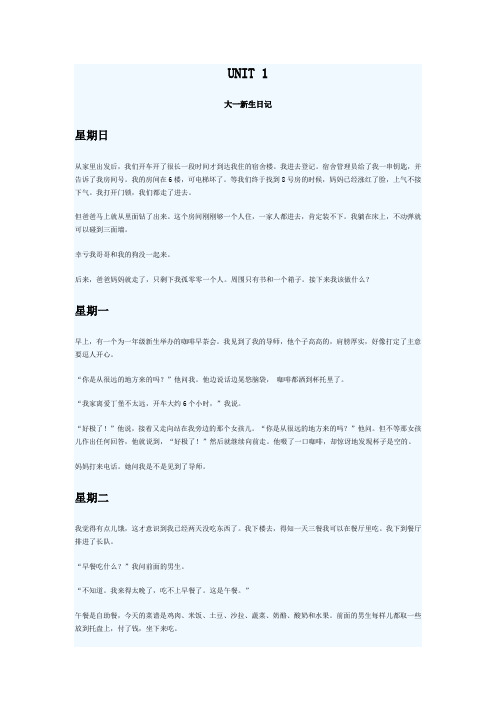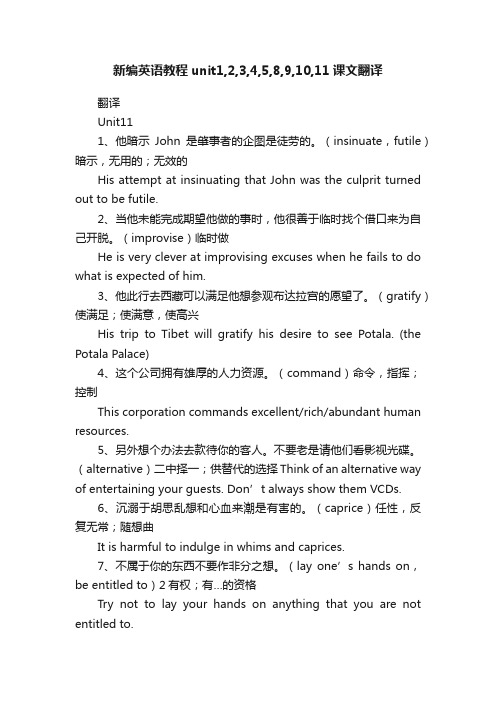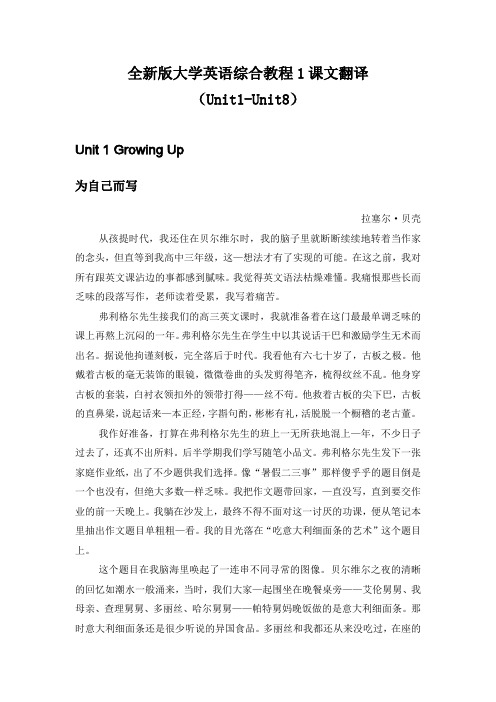新编英语教程1 第一单元课文翻译
延边大学新编第一册英译汉(大一英语)

英译汉Unit 11. A quick blood typing showed that neither American had the correct blood type.快速的血型测定显示两名美国人的血型都不合适。
2. Their request was met with wide-eyed silence. Their little patient’s life hung in the balance.对他们的请求,孩子们瞪大眼睛,一声不吭。
此时小病人生命垂危。
3.Heng was quickly laid on a bed, his arm cleaned with alcohol, and the needle inserted into his arm.兴很快被抱到一张床上,手臂用酒精消毒后,针就扎了进去。
4.The medical team now was very worried because the needle should not have beenhurting their tiny patient.医疗小组此时非常担忧,因为针不会使他们的小输血者一直感到疼痛。
5.Greater love has no man than this, that he lay down his life for a friend.他为了朋友甘愿献出自己的生命,没有比这更伟大的爱了。
Unit 21.As I was walking by the shops, I happened to see a display of flight bags, whichreminded me of my briefcase.当我走过那些店铺时,碰巧看到陈列在那儿的航空箱包,这使我想起了自己的公文包。
2. Knowing that I had not stopped anywhere since I left the airline ticket counter, I concluded I must have put it down there.自从离开航空公司票务柜台后,我没有在其他任何地方停留过,所以我推想,我一定是把包留在那里了。
李观仪《新编英语教程(1)》第3版学习指南【词汇短语+课文精解+全文翻译+练习答案】(Unit 1)

李观仪《新编英语教程(1)》第3版学习指南【词汇短语+课文精解+全文翻译+练习答案】Unit1一、词汇短语Text I1.clumsy[]adj.moving or doing things in a very awkward way笨拙的,拙劣的:I spilt your coffee.Sorry—that was clumsy of me.我把你的咖啡弄洒了。
对不起,我太笨了。
2.hammer[]v.敲打n.a tool that consists of a heavy piece of metalat the end of a handle锤子:To avoid damaging the tree,hammer awooden peg into the hole.为了避免毁坏这棵树,把一只木钉敲进那个洞里。
3.deft[]adj.skilful and often quick灵巧的,敏捷熟练的:With a deft flick ofhis wrist,he extinguished the match.他的手腕灵巧地一抖,就熄灭了火柴。
【扩展】近义词:dexterous灵巧的,熟练的4.squarely[‘ɛ]adv.directly or in the middle,rather than indirectly orat an angle正好、正中地:I kept the gun aimed squarely at his eyes.我一直把枪直直瞄准他的眼睛。
5.apt[]adj.exactly suitable适当的,恰当的:The words of this report are as apttoday as in1929.这份报告的措辞在当今如在1929年一样恰当。
6.scrupulous[]adj.correct even in the smallest detail;exact严格认真的,审慎的:You’re being very scrupulous,but to whatend?你表现得很认真,但目的是什么呢?7.subtle[]adj.not very noticeable or obvious细致的,微妙的,不易察觉的:The truth is subtly different.事实略有不同。
新标准大学英语综合教程1(Unit1-Unit6课文翻译)

UNIT 1大一新生日记星期日从家里出发后,我们开车开了很长一段时间才到达我住的宿舍楼。
我进去登记。
宿舍管理员给了我一串钥匙,并告诉了我房间号。
我的房间在6楼,可电梯坏了。
等我们终于找到8号房的时候,妈妈已经涨红了脸,上气不接下气。
我打开门锁,我们都走了进去。
但爸爸马上就从里面钻了出来。
这个房间刚刚够一个人住,一家人都进去,肯定装不下。
我躺在床上,不动弹就可以碰到三面墙。
幸亏我哥哥和我的狗没一起来。
后来,爸爸妈妈就走了,只剩下我孤零零一个人。
周围只有书和一个箱子。
接下来我该做什么?星期一早上,有一个为一年级新生举办的咖啡早茶会。
我见到了我的导师,他个子高高的,肩膀厚实,好像打定了主意要逗人开心。
“你是从很远的地方来的吗?”他问我。
他边说话边晃悠脑袋,咖啡都洒到杯托里了。
“我家离爱丁堡不太远,开车大约6个小时,”我说。
“好极了!”他说,接着又走向站在我旁边的那个女孩儿。
“你是从很远的地方来的吗?”他问。
但不等那女孩儿作出任何回答,他就说到,“好极了!”然后就继续向前走。
他啜了一口咖啡,却惊讶地发现杯子是空的。
妈妈打来电话。
她问我是不是见到了导师。
星期二我觉得有点儿饿,这才意识到我已经两天没吃东西了。
我下楼去,得知一天三餐我可以在餐厅里吃。
我下到餐厅排进了长队。
“早餐吃什么?”我问前面的男生。
“不知道。
我来得太晚了,吃不上早餐了。
这是午餐。
”午餐是自助餐,今天的菜谱是鸡肉、米饭、土豆、沙拉、蔬菜、奶酪、酸奶和水果。
前面的男生每样儿都取一些放到托盘上,付了钱,坐下来吃。
我再也不觉得饿了。
妈妈打电话来。
她问我有没有好好吃饭。
星期三早上9点钟我要去听一个讲座。
我醒时已经8:45了。
竟然没有人叫我起床。
奇怪。
我穿好衣服,急匆匆地赶到大讲堂。
我在一个睡眼惺忪的女生旁边坐下。
她看了看我,问:“刚起床?”她是怎么看出来的?讲座进行了1个小时。
结束时我看了看笔记,我根本就看不懂自己写的字。
那个女生名叫苏菲,和我一样,也是英语文学专业的学生。
新编英语教程unit1,2,3,4,5,8,9,10,11课文翻译

新编英语教程unit1,2,3,4,5,8,9,10,11课文翻译翻译Unit111、他暗示John是肇事者的企图是徒劳的。
(insinuate,futile)暗示,无用的;无效的His attempt at insinuating that John was the culprit turned out to be futile.2、当他未能完成期望他做的事时,他很善于临时找个借口来为自己开脱。
(improvise)临时做He is very clever at improvising excuses when he fails to do what is expected of him.3、他此行去西藏可以满足他想参观布达拉宫的愿望了。
(gratify)使满足;使满意,使高兴His trip to Tibet will gratify his desire to see Potala. (the Potala Palace)4、这个公司拥有雄厚的人力资源。
(command)命令,指挥;控制This corporation commands excellent/rich/abundant human resources.5、另外想个办法去款待你的客人。
不要老是请他们看影视光碟。
(alternative)二中择一;供替代的选择Think of an alternative way of entertaining your guests. Don’t always show them VCDs.6、沉溺于胡思乱想和心血来潮是有害的。
(caprice)任性,反复无常;随想曲It is harmful to indulge in whims and caprices.7、不属于你的东西不要作非分之想。
(lay one’s hands on,be entitled to)2有权;有…的资格Try not to lay your hands on anything that you are not entitled to.8、他没有来参加竞赛。
新编第一册Unit 1,2,5,8翻译答案

Unit 1Translation1)I am tried. I should not have stayed up too late last night.2)I am not quite acquainted with Bob, yet we go out for an occasional drink together.3)We are supposed to meet her at the train station.4)You could clearly see people drowning, but/and yet you didn't take any action to save them. 5)Including weekends, there are only twelve more days left to buy Christmas gifts.6)Without immediate action, many wild animals would die from hunger.Unit 2Translation1)The song always reminded her of the night in Chicago.2)There happened to be a policeman around the corner, so I asked him the way.3)All flights to New York are/were delayed because of the nasty/bad weather.4)Whoever is responsible must compensate for the loss.5)I can't find my checkbook. I must have left it at home.6)The storm had already stopped by the time the football match was going to begin.Unit 5Translation1)I used to go to the cinemas a lot,but I never have the time now.2)The two workers cooperated with each other to fix the broken pipe.3)This is cruel practice which must be stopped right away.4)What aspect of your job/work is the most challenging, and what aspect is the most rewarding? 5)Some people perceive him to be rude, but this is not the case.6)I'll help as possible as I can, but there's a limit to what I can do.Unit 8Translation1)The Second World War took place in 1945.2)My grandfather drinks a great deal of wine.3)By the age of 65, he was still working.4)The teacher knows all her student by name.5)The police succeeded in solving the mysterious case.6)He likes various sports, but most of all, he likes basketball particularly.7)Talking through telephone is very different from face to face talk.8)They fell in love with each other for they have common interests.。
全新版大学英语综合教程1课文翻译(Unit1-Unit8)

全新版大学英语综合教程1课文翻译(Unit1-Unit8)Unit 1 Growing Up为自己而写拉塞尔·贝壳从孩提时代,我还住在贝尔维尔时,我的脑子里就断断续续地转着当作家的念头,但直等到我高中三年级,这—想法才有了实现的可能。
在这之前,我对所有跟英文课沾边的事都感到腻味。
我觉得英文语法枯燥难懂。
我痛恨那些长而乏味的段落写作,老师读着受累,我写着痛苦。
弗利格尔先生接我们的高三英文课时,我就准备着在这门最最单调乏味的课上再熬上沉闷的一年。
弗利格尔先生在学生中以其说话干巴和激励学生无术而出名。
据说他拘谨刻板,完全落后于时代。
我看他有六七十岁了,古板之极。
他戴着古板的毫无装饰的眼镜,微微卷曲的头发剪得笔齐,梳得纹丝不乱。
他身穿古板的套装,白衬衣领扣外的领带打得——丝不苟。
他救着古板的尖下巴,古板的直鼻梁,说起话来—本正经,字斟句酌,彬彬有礼,活脱脱一个橱稽的老古董。
我作好准备,打算在弗利格尔先生的班上一无所获地混上—年,不少日子过去了,还真不出所料。
后半学期我们学写随笔小品文。
弗利格尔先生发下一张家庭作业纸,出了不少题供我们选择。
像“暑假二三事”那样傻乎乎的题目倒是一个也没有,但绝大多数—样乏味。
我把作文题带回家,—直没写,直到要交作业的前一天晚上。
我躺在沙发上,最终不得不面对这一讨厌的功课,便从笔记本里抽出作文题目单粗粗—看。
我的目光落在“吃意大利细面条的艺术”这个题目上。
这个题目在我脑海里唤起了一连串不同寻常的图像。
贝尔维尔之夜的清晰的回忆如潮水一般涌来,当时,我们大家—起围坐在晚餐桌旁——艾伦舅舅、我母亲、查理舅舅、多丽丝、哈尔舅舅——帕特舅妈晚饭做的是意大利细面条。
那时意大利细面条还是很少听说的异国食品。
多丽丝和我都还从来没吃过,在座的大人也是经验不足,没有—个吃起来得心应手的。
艾伦舅舅家诙谐有趣的场景全都重现在我的脑海中,我回想起来,当晚我们笑作—团,争论着该如何地把面条从盘子上送到嘴里才算合乎礼仪。
新编大学英语教程(1)课后翻译答案
《新编大学英语》课后翻译练习答案Unit 11. I’m tired. I should not have gone to bed so late last night.2. I don’t/didn’t know Bob very well, but we go/went out for an occasional drink together.3. We’re supposed to meet her at the railway station.4. Y ou could clearly see people drowning, but/and yet you took no actionto save them.5. Including weekends, there are only twelve more days to buy Christmas presents.6. Without immediate action, many kinds of wild animals would die from hunger.Unit 21. That song always reminded her of the night spent in Chicago.2. There happened to be a policeman on the corner, so I asked him the way.3. All flights to New Y ork today are/were delayed because of the bad weather.4. Whoever is responsible will have to pay for the damage.5. I can’t find my checkbook. I must have left it at home.6. By the time the football match was going to start, the storm had already stopped.Part Four1. A young man came to the check-in counter and asked if his briefcase had been turned in.2. He looked over my shoulder at the conveyor belt and shouted that he had seen his briefcase going through the opening at the end of the conveyor belt3. Unfortunately, his briefcase had already been loaded on one of the flights.4. I assured him that we would call him as soon as we found his briefcase.5. To our great surprise, the young man said that he had already found his briefcase in his car.Unit 31. Y ou won’t get the job unless you’ve got the experience.2. Most of my time is spent studying the differences between Chinese and American cultures.3. The statement/sentence is so clear that it can’t cause any misunderstanding.4. He wishes he could give her more help than he does.5. Put on your coat or you’ll catch cold.6. She has added a Picasso to her collection.7. I am not aware of ever having been here before.8. Y ou will soon find yourself without any friends at all if you keep on being so rude to everybody.Part Four1. First, you should be aware that feeling nervous in a new environment is quite normal.2. Our thoughts race along several times faster than most people speak.3. In order to get others to pay attention to you, you must first learn how to be a good and sympathetic listener.4. One of the essential points is that you should try to broaden your horizons.5. A sense of humor is helpful and you can lighten a conversation by sometimes telling a joke about yourself.6. Only when you are ready to talk and listen attentively will you succeed in making friends with the people around you.Unit 41. It’s far too hot in the room; open the window, please!2. The noise woke us up in the middle of the night.3. He shouldn’t have been angry at what I said. It was nothing more thana joke.4. We invited all our friends to the picnic but it rained and only five of them showed up.5. She views marriage as a serious matter.6. To my disappointment, the movie didn’t live up to my expectations.Unit 51. I used to go the cinema/movies a lot, but I never have the time now.2. The two workers cooperated with each other to fix the broken pipe.3. This is a cruel practice which should be stopped immediately.4. What aspect of your job/work is (the) most difficult, and what aspect is (the) most rewarding?5. Some people think he is rude, but that’s not the case.6. I’ll help as much as I can, but there is a limit to what I can do.Part 4(1). bring pleasure/happiness to peopleadd joy to people’s lifeexpress one’s feelings/emotionsdeliver messagescarry heavy loadsaccomplish different tasksguide the blindguard people’s possessionscatch pestsmake contributionsmake the world more colorfulmaintain the balance of nature(2). They are perceived to be humans’best friends. People like to keep them as pets.(3). They are intelligent, lovely and obedient. They can amuse people by performing different tasks.(4).Their contributions to human beings far outweigh what they destruct.(5). They are excellent companions of human beings. They are not only loyal to people but also can help man do a lot of things.Unit 71. We’re considering selling the house.2. I suggest he wait a while before he makes any decision.3. John is very likely to come to the party tomorrow.4. We’d like to know the reason why she didn’t accept the job.5.Y ou shouldn’t have gone back to the burning building—you might have been badly/seriously burnt.6. It/The thought had never crossed my mind that there might be a problem.。
新编英语教程第一册Unit01
Unit 1DIALOGUE IBack from the Summer CampA: You know what? I've just come back from a wonderful summer camp.B: You have? Where did you go?A: Mount Tai.B: I've been there too. It's one of China's most beautiful mountains. There're many scenic spots and places of historical interest. I was greatly impressed by its natural beauty when I took a study tour there two years ago.A: It really is a very beautiful tourist attraction. But we went there as campers, not as tourists. It was a study programme organized by our local community committee.B: I bet you had lots of fun there.A: Yes, it was a wonderful experience. You know it was the first time I'd been to a summer camp in five years, and it brought back such sweet memories.B: Were there any other camping groups when you were there?A: Not when we arrived at the foot of the mountain. But soon we were joined by many similar camping groups from other cities. By the time we arrived at the campsite, night had fallen. And we were so happy to see that the campers who arrived there the day before were giving a performance by the campfire.B: You remind me of my last trip there. I wish I had been there with you this time. What did you do at the summer camp? A: Oh, lots of things. Most of the time we studied plants, rocks, insects... things like that. We also had lots of fun, hiking, climbing mountains, taking pictures...B: I guess you had the life of a natural scientist.A: And the life of an athlete, too.B: I had a similar experience during the summer two years ago. I remember my summer camp was subdivided into what we called "hobby groups", such as the music group, the drama group, and the model aircraft and ship group. People sharing similar interests and hobbies worked together. Were there any hobby groups in your programme?A: Yes, of course. We had a number of hobby groups for campers with varied interests. We called them "project groups" because each group worked on a particular project. At the completion of their projects, each group presented their "fruits" to all the campers. Some gave oral reports, some staged an exhibition, and others put on a performance.B: You had a marvellous time this summer! Your story has really brought back happy memories of my own camping experience.DIALOGUE IIDialogue:Sally Jones, an English language teacher from Oxford University, has just arrived at Beijing Airport. She is going to spend three months here, lecturing and teaching at different colleges and universities. Miss Wang, Secretary of the English Department, and Mr. Yu, Vice Chairman of the English Department, have come to the airport to meet her.Miss Wang: Excuse me, are you Miss Jones?Sally: Yes, that's right.Miss Wang: Oh, how do you do? I'm Wang Xinfu, Secretary of the English Department.Sally: Oh, yes, Miss Wang, hello. I'm very pleased to meet you. (They shake hands.)Miss Wang: Miss Jones, may I introduce you to Mr. Yu, Vice Chairman of the English Department?Mr. Yu: Hello, Miss Jones, I've been looking forward to meeting you.Sally: How do you do? (They shake hands.) It's very kind of you both to come and meet me at the airport.Miss Wang: Not at all. I hope you had a good flight.Sally: Well, not too bad. It was a bit bumpy as we came in to land; some low clouds, I think.Mr. Yu: Yes, we had a storm here yesterday and the weather is still a bit unsettled.Sally: Oh, dear! I was rather lucky then!Miss Wang: You must be rather tired after your long flight.Sally: Well, yes, I am actually... I've been travelling for 21 hours!Mr. Yu: In that case, I think we should go straight to the hotel.Miss Wang: Yes, I agree. This way then, ... if you'd like to follow me.READING IHerbert's HomecomingHerbert Marshall was a student at Cambridge, but his hometown was St. Albans. It was August and the family had gone to the seaside. Herbert went to France for his holiday, but he ran out of money, and came home a week earlier than he had expected to.His train didn't get into St. Albans until just before midnight. The last bus had gone, so he had to walk home. He let himself into the kitchen, and as he was feeling hot and sticky, he took off his shirt to have a wash.Suddenly he heard heavy footsteps running up the path. The back door burst open, and he found himself surrounded by policemen. They pushed him into the living-room next door, made him sit down, and began asking him question."What's your name?""Where do you live?""What's in that case?""What are you doing here?""I live here," said Herbert, "I've been on holiday." But nobody listened to him. They just went on asking questions. Then suddenly one of the policemen said:"Watch him, Frank — we'll go and search the house."They left a tall, very young policeman to guard him."Can I put my shirt on?" asked Herbert."No," said the policeman, "stay where you are."Then the others came back with an older man, a sergeant. He asked the same questions, but he listened to Herbert's answers."I live here," said Herbert, "and I want to put my shirt on." The sergeant looked at him thoughtfully."We'll soon settle this," he said.He went out and came back with a small, sandy-haired man wearing a shabby, brown dressing-gown. It was Herbert's next-door neighbour. He peered at Herbert intently through thick spectacles."Oh, yes, sergeant," he said, "that is Mr. Marshall." Then he disappeared very quickly. The policemen all looked dreadfully disappointed. They were convinced they had caught a burglar."Did he ring you up?" asked Herbert. The police sergeant nodded."He saw a light and understood your family had all gone away to the seaside."When they had all gone, Herbert made himself a cup of coffee.。
第五版新编实用英语综合教程1课文翻译
第五版新编实用英语综合教程1课文翻译Unit 1人们对沟通的热爱从未改变在过去,帮助家庭成员和朋友保持联系的是一张小小的邮票。
随着电话的到来,人们不仅能读到文字,还能听到对方的声音。
再后来,互联网的兴起让身处四面八方的人们可以通过QQ、视频电话、博客和脸书进行沟通。
如今,微信更为人们提供了更多的交流方式。
大多数年轻人希望享受来自家人和朋友温暖的关爱,但又不想要太多的管控。
他们想紧跟时代,同时又渴望心灵的宁静。
新的沟通方式使这成为可能。
通常,他们只需要一个简单的“你好”就可以把昨天的陌生人变成今天的朋友;同样他们也可以在朋友圈里长久地潜水。
这种变化有利有弊。
许多人担心自己的隐私。
许多父母担心孩子的朋友圈,太大太杂了!然而,新的沟通方式可以给予他们做出明智选择的自由和机会。
父母们自己也可以试试!Unit 2志愿者, 谢谢你们!每年年底,我们都会尽力向那些使我们的生活变得更美好的志愿者们表达感激之情。
因此,在12月我们往往会想方设法来表达我们对他们的谢意。
以下是一些网上的帖子,都是用于感谢那些自愿提供各种帮助的人。
请员工和志愿者同进百味餐我喜欢在办公室里设百味餐,邀请志愿者来参加,让他们感到自己是团队中的一员。
我只要求志愿者们带着旺盛的食欲来。
(Nazia Anderson,贴于2018年12月29日)在感恩节送出谢意今年我给志愿者们送出感恩节卡片。
这是年末表达我们感激之情的极好方式;这能使我们的志愿者知道,我们对他们在这繁忙的一年所做的一切心怀感激。
(Traci Lato,贴于2018年12月1日)向志愿者们脱帽致敬我们图书馆的志愿者收到了各种各样的篮装糖果、盒装巧克力,还有鲜花、绿植等。
员工们整个星期都戴着帽子,一见到志愿者们就向他们脱帽致敬。
这儿的志愿者们似乎很欣赏我们以这种无声的行动表达对他们的认(AimeeHepler,贴于2018年12月20日)下午看电影在“国家志愿者周”,我们请志愿者看电影,以表达对他们的谢意。
新编大学英语Unit 1--8 课文翻译
Unit 1 PersonalityIn-Class Reading羞怯的痛苦1 对许多人来说,羞怯是很多不愉快的起因。
各种各样的人——矮的、高的、愚笨的、聪明的、年轻的、年老的、瘦的、胖的——都说自己是羞怯的。
羞怯的人会焦虑不安,感到不自然;也就是说,他们过分地关注自己的外表和举止。
脑海中不断盘旋着一些使自己不安的想法:我给人留下的是什么印象?他们喜欢我吗?我讲话是不是傻里傻气?我长得难看。
我穿的衣服毫不引人注目。
2 很显然这种不安的感觉会对人产生不利的影响。
一个人的自我看法反映在自己的行为方式之中,而一个人的行为方式又影响他人的反应。
通常,人们如何看待自己对他们生活的各个方面都会产生深刻的影响。
例如,具有积极的自我价值观或很强自尊心的人往往表现出自信。
而由于自信,他们不需要他人不断地称赞和鼓励,也能使自己感觉良好。
自信者热情、自发地投入生活。
他们不因别人认为他们“该”做什么而受到影响。
有很强自尊心的人不会被批评所伤害;他们不会把批评看作是人身攻击。
相反,他们认为批评是一种提醒他们改进的建议。
3 相比之下,羞怯的人自尊心较弱,往往消极被动并且容易受他人影响。
他们(是否)在做“该做的事情”需要得到别人的肯定。
害羞的人对批评非常敏感;他们觉得批评正好证实了他们比别人差。
他们也很难因别人的赞美而高兴,因为他们相信自己不值得称赞。
羞怯的人也许会用这样的话来回答别人的赞美之辞:“你这么说只是为了让我感觉好一些。
我知道这不是真的。
”显然,尽管自我意识是一种健康的品质,过分的自我意识却是不利和有害的。
4能否彻底消除或者至少减轻羞怯感呢?幸运的是,人们能够通过坚持不懈的努力建立自信从而克服羞怯。
由于胆怯和缺少自尊是密切相关的,因此正视自己的弱点和正视自己的优点一样重要。
例如,大多数人希望每门功课都得A。
5 如果仅仅因为在某些领域有困难,就把自己列为差生,这不恰如其分。
人们对自己的期望必须现实。
老是想那些不可能的事情会令自己觉得无能,甚至产生嫉妒。
- 1、下载文档前请自行甄别文档内容的完整性,平台不提供额外的编辑、内容补充、找答案等附加服务。
- 2、"仅部分预览"的文档,不可在线预览部分如存在完整性等问题,可反馈申请退款(可完整预览的文档不适用该条件!)。
- 3、如文档侵犯您的权益,请联系客服反馈,我们会尽快为您处理(人工客服工作时间:9:00-18:30)。
赫伯特回家
赫伯特马歇尔是剑桥大学的学生,但他的家乡在圣奥尔本斯。
8月份,全家都去了海边。
赫伯特去法国度假,但他的钱用完了,于是比预期的计划提前了一个星期回家。
他乘坐的火车午夜才抵达圣奥尔本斯。
最后一班公汽走了,他只得步行回家。
他直接走进厨房,因为感觉太热,身上粘呼呼,他脱掉衬衫,准备洗一洗。
突然他听到从小路跑过来的沉重脚步声。
门突然打开,警察围住了他。
他们把他推进隔壁的客厅,让他坐下,开始问他问题。
“你叫什么名字?”
“你住在哪里?”
“那个箱子里有什么东西?”
“你在这儿干什么?”
“这是我家。
”赫伯特说。
“我放假了。
”但没有人相信他。
他们只是不断地问问题。
突然一个警察说:
“弗兰克,看住他——我们去搜查一下房子。
”
他们留下一个高个儿,年轻的警察看守他。
“我可以穿上衬衣吗?”赫伯特问。
“不行,”警察说,“呆着别动。
”
随后,其他人跟着一位年长一点的男警官回来了。
他询问了同样的问题,但他相信赫伯特的回答。
“我住在这里,”赫伯特说,“我想穿上衬衣。
”警官沉思地注视着他。
“我们马上解决这个问题。
”他说。
他出去了,回来时带了一个黄棕色头发的矮个男人,穿着一件邋遢的衬衣。
这是赫伯特隔壁的邻居。
他透过厚厚的眼镜凝视着赫伯特。
“哦,是的,警官,”他说,“那是马歇尔先生。
”然后他很快溜了。
警察们都非常失望。
他们以为逮住了一个夜盗犯。
“是他给你打得电话吗?”赫伯特问。
警官点点头。
“他看到灯光,而且知道你家里的人都去了海边。
”
警察走后,赫伯特为自己煮了一杯咖啡。
